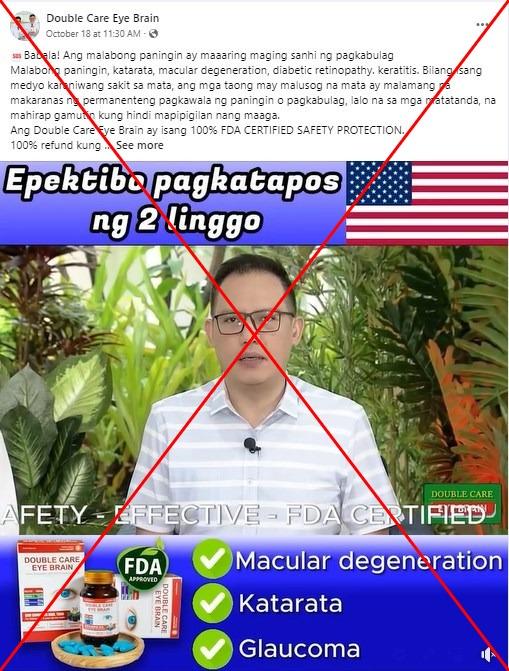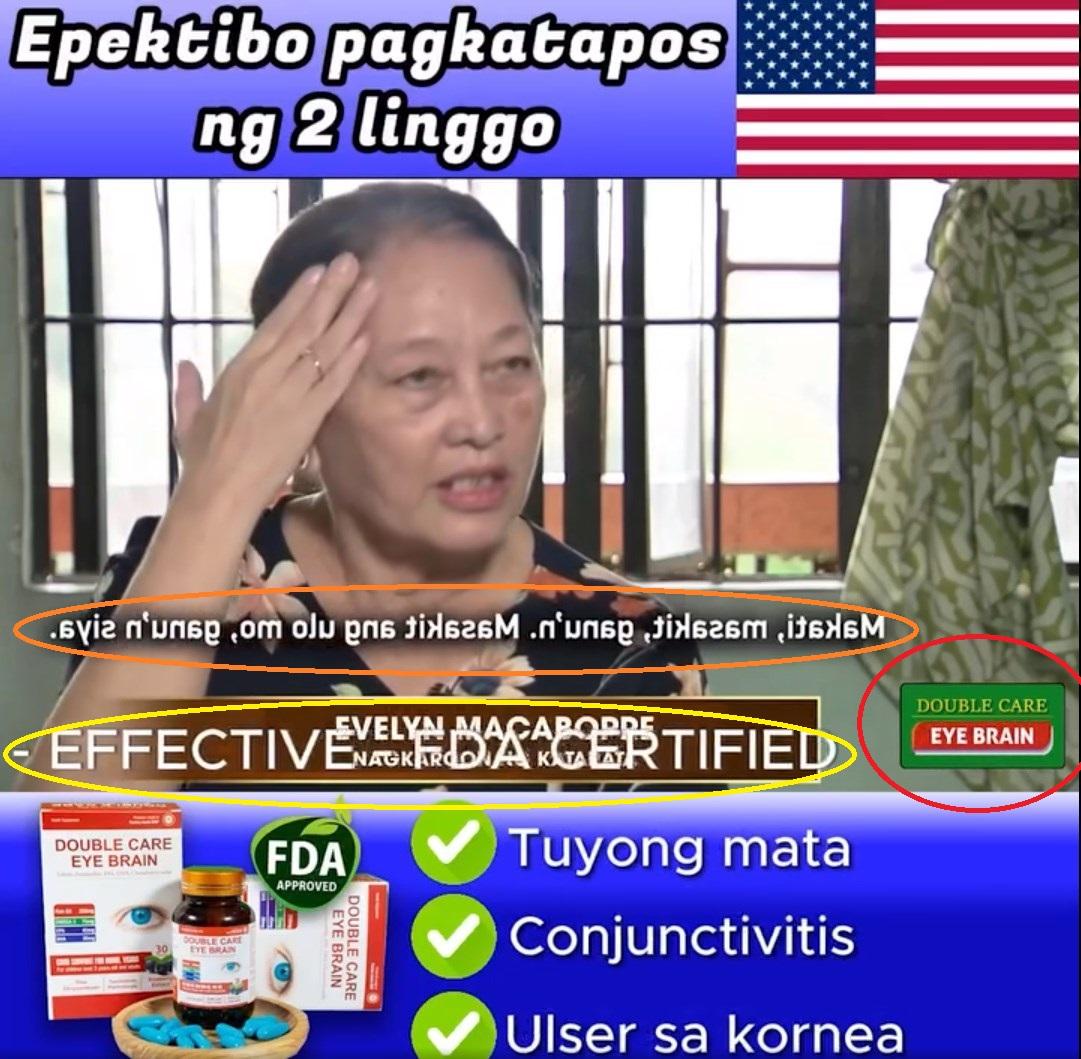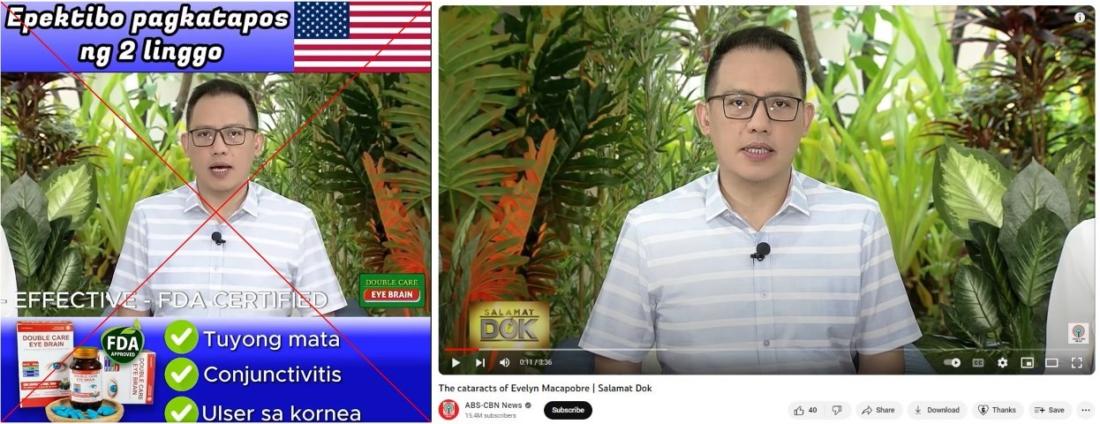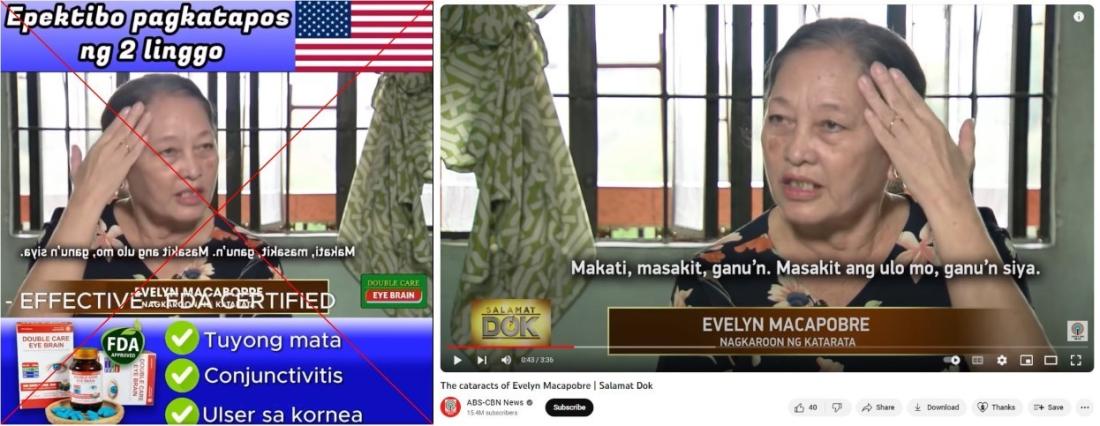
News report altered to promote unregistered 'eye supplement' in the Philippines
- This article is more than two years old.
- Published on October 27, 2023 at 11:11
- 4 min read
- By Jan Cuyco, AFP Philippines
"DOUBLE CARE EYE BRAIN -- best product of all time -- effective after two weeks of use," reads a Facebook post shared on October 18, 2023.
It appears to show a segment from the now-defunct medical programme Salamat Dok, which in Tagalog language means "Thanks Doc".
The clip begins with newscaster Alvin Elchico talking about a 61-year-old woman gradually losing her vision who later finds out her symptoms were from a serious case of cataract.
References to a dietary supplement called "Double Care Eye Brain" could be seen in the clip.
The post says the supplement is registered by the Food and Drug Administration (FDA) to treat a range of eye diseases such as cataract, macular degeneration, diabetic retinopathy, keratitis and glaucoma.

The same video was also viewed more than 58,000 times here, here and here alongside a similar claim on Facebook.
Comments on the posts suggest some users were convinced of the product's touted health benefits and inquired how to buy.
"Do they also sell these in drug stores?" wrote one user.
"How much does one box cost? How many tablets are sold for every box?" asked another.
However, the product is not registered with the FDA and medical experts separately told AFP no dietary supplement can cure eye diseases without medication or surgery.
Unfounded health claims
Keyword searches on the FDA's database of food and drug products did not find a registration for the "Double Care Eye Brain" product promoted in the post.
The agency's household and urban hazardous substances regulation division told AFP on October 23 the product has not been certified.
Dr. Alex Pisig, an ophthalmologist and retina specialist at the Asian Eye Institute in the Philippines, told AFP on October 20 the claim in the posts is "misleading, baseless and overreaching."
Cataract can only be treated by surgery, Pisig said, though the formation of cataract can be slowed down by "smoking cessation, eye injury prevention, diabetes control, avoiding certain medications such as steroids, and protection from UV rays."
Diabetic retinopathy -- an eye disease induced by diabetes -- is treated by controlling blood sugar and pressure levels. This eye condition can also be treated with laser therapy, injection and surgery depending on its severity.
Dr. Glenn Carandang, an ophthalmologist and vitreo-retina surgeon at the Manila-based St. Luke's Medical Center, separately told AFP on October 23 there is no truth to the dietary supplement's touted health claims.
Carandang said prescribed medication is needed to treat glaucoma (a disease that damages nerves in the eye) and keratitis (inflammation of the cornea) -- and these medications cannot be substituted with vitamins.
Treatment of age-related macular degeneration disease ranges from injection of drugs into the eye and laser therapy. Mineral supplements are recommended for patients with milder disease to slow down disease progression and not to reverse the condition, the experts say.
"If you use the wrong treatment or you get vitamins or supplements that are not meant to treat [your eye disease], eventually it will lead to blindness." Carandang said.
Misused news report
The original news segment, which is 3:16 minutes long, was posted by Philippine broadcaster ABS-CBN News on YouTube on May 12, 2019 (archived link).
The recently shared false video shows a mirrored version of the old news report until the 1:56 mark before inserting references to the dietary supplement.
It also added a mark of the product's name in the lower right portion of the video together with ticker text that reads: "Commitment 100% Safety - Effective - FDA Certified" below the video.
AFP highlighted indications that the video has been digitally altered in the screenshot below:

Arlene Burgos, digital head of engagement and partnerships for ABS-CBN News, told AFP on October 26: "I can confirm that the 'Salamat Dok' segment in 2019 by ABS-CBN News was taken out of context."
Below are screenshot comparisons of the altered clip (left) and the old Salamat Dok news segment (right):


AFP has previously fact-checked doctored news reports endorsing bogus and unregistered products here, here and here.
Copyright © AFP 2017-2026. Any commercial use of this content requires a subscription. Click here to find out more.
Is there content that you would like AFP to fact-check? Get in touch.
Contact us
